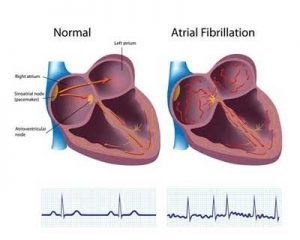- Home
- Editorial
- News
- Practice Guidelines
- Anesthesiology Guidelines
- Cancer Guidelines
- Cardiac Sciences Guidelines
- Critical Care Guidelines
- Dentistry Guidelines
- Dermatology Guidelines
- Diabetes and Endo Guidelines
- Diagnostics Guidelines
- ENT Guidelines
- Featured Practice Guidelines
- Gastroenterology Guidelines
- Geriatrics Guidelines
- Medicine Guidelines
- Nephrology Guidelines
- Neurosciences Guidelines
- Obs and Gynae Guidelines
- Ophthalmology Guidelines
- Orthopaedics Guidelines
- Paediatrics Guidelines
- Psychiatry Guidelines
- Pulmonology Guidelines
- Radiology Guidelines
- Surgery Guidelines
- Urology Guidelines
AFib after CABG has low stroke risk compared to nonvalvular AF

New-onset postoperative atrial fibrillation (POAF) is a frequent complication of coronary artery bypass graft (CABG) surgery, with a reported incidence of 11% and 40%. Dr.Jawad H. Butt and associates conducted a cohort study to examine stroke prophylaxis and the long-term risk of thromboembolism in patients with new-onset POAF after first-time isolated CABG surgery compared with patients with nonsurgical, nonvalvular atrial fibrillation (NVAF).They found that Patients of new-onset postoperative atrial fibrillation (POAF) after coronary artery bypass graft (CABG) surgery showed a 33 percent reduced risk of thromboembolism long-term when compared to those with nonvalvular AFib (NVAF).The study has been published in JAMA Cardiology.
The researchers compared 2108 patients with postoperative atrial fibrillation with 8432 matched patients with nonvalvular atrial fibrillation, postoperative atrial fibrillation was associated with a significantly lower risk of thromboembolism.The study used data from a clinical cardiac surgery database and Danish nationwide registries to identify patients undergoing first-time isolated CABG surgery who developed new-onset POAF from January 1, 2000, through June 30, 2015. These patients were matched by age, sex, CHA2DS2-VASc score, and year of diagnosis to patients with nonsurgical NVAF in a 1 to 4 ratio. Data analysis was completed from February 2017 to January 2018.
They found that:
- Thromboembolism occurred at a rate of 18.3 events per 1,000 person-years for POAF versus 29.7 per 1,000 years for NVAF. The adjusted relative risk difference was 33 percent.
- The use of post-discharge anticoagulation therapy was associated with similar decreases in risk of thromboembolism for both POAF (45 percent reduction) and NVAF (41 percent reduction). However, only 8.4 percent of POAF patients received OACs within 30 days of discharge, while 42.9 percent of NVAF patients were prescribed OACs.
- Among all CABG patients, the risk of thromboembolism was 11 percent higher for those who developed POAF versus those who didn’t, but that figure failed to reach statistical significance.
The researchers concluded that New-onset POAF in patients who had undergone CABG surgery was associated with a lower long-term thromboembolic risk than that of patients who had NVAF. These data do not support the notion that new-onset POAF should be regarded as equivalent to primary NVAF in terms of long-term thromboembolic risk.The findings do not support the notion that new-onset postoperative atrial fibrillation should be regarded as equivalent to primary nonvalvular atrial fibrillation in terms of long-term thromboembolic risk.
For further reference log on to : doi:10.1001/jamacardio.2018.0405

Disclaimer: This site is primarily intended for healthcare professionals. Any content/information on this website does not replace the advice of medical and/or health professionals and should not be construed as medical/diagnostic advice/endorsement or prescription. Use of this site is subject to our terms of use, privacy policy, advertisement policy. © 2020 Minerva Medical Treatment Pvt Ltd